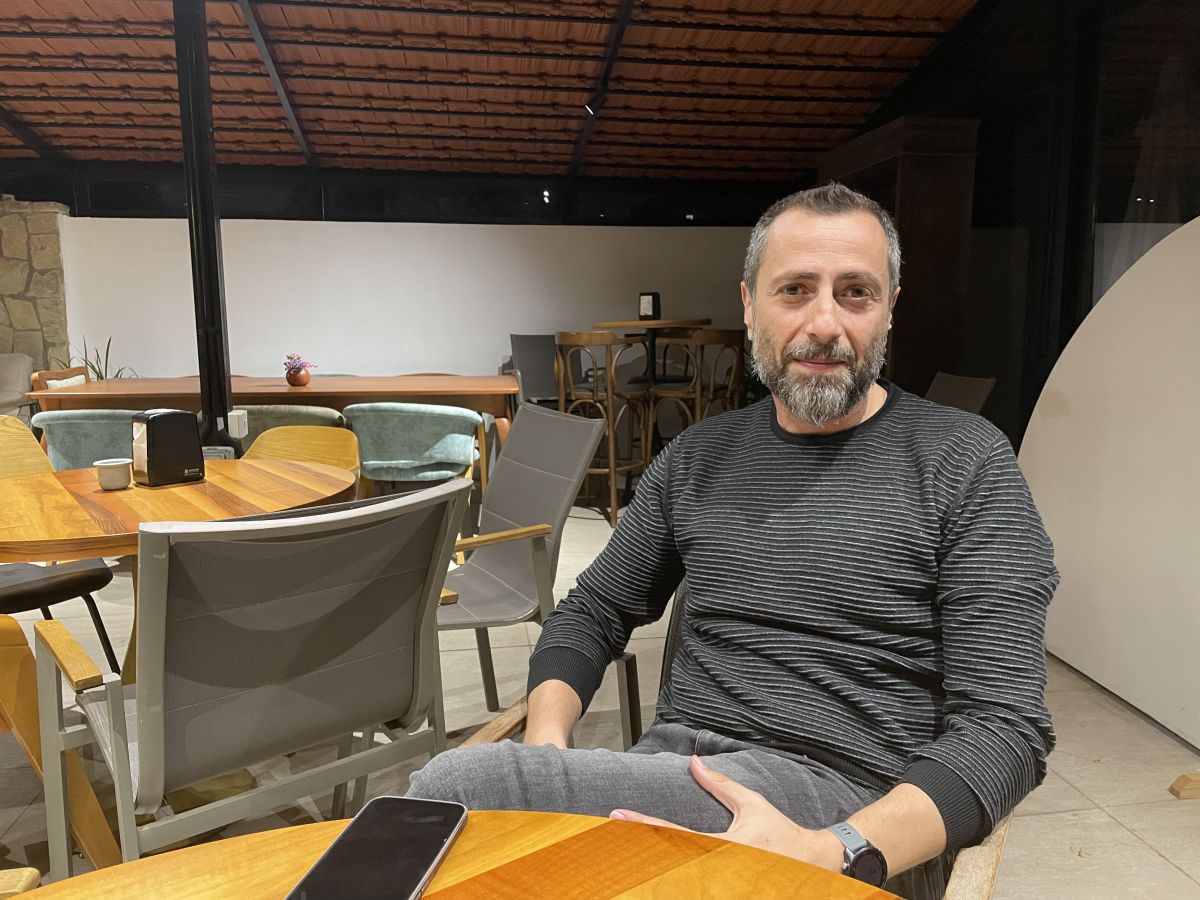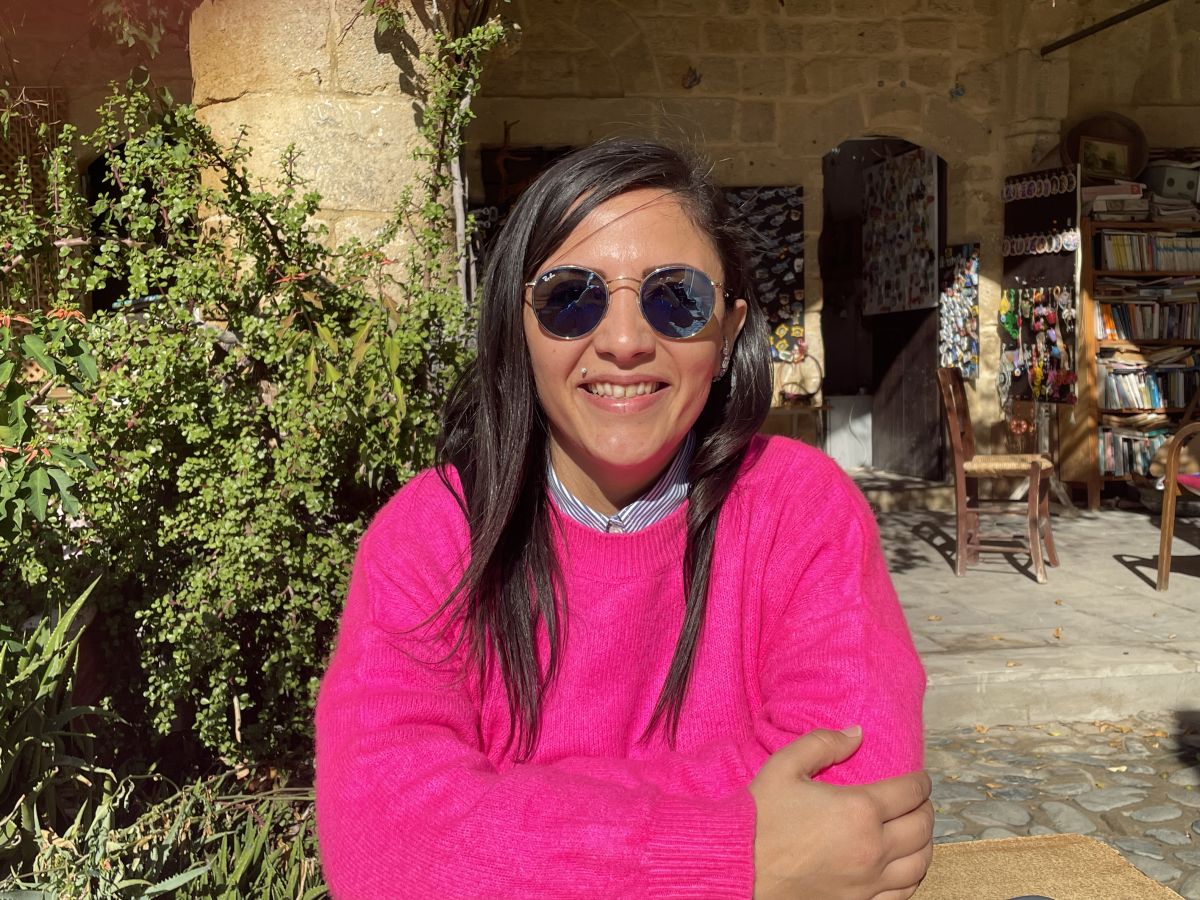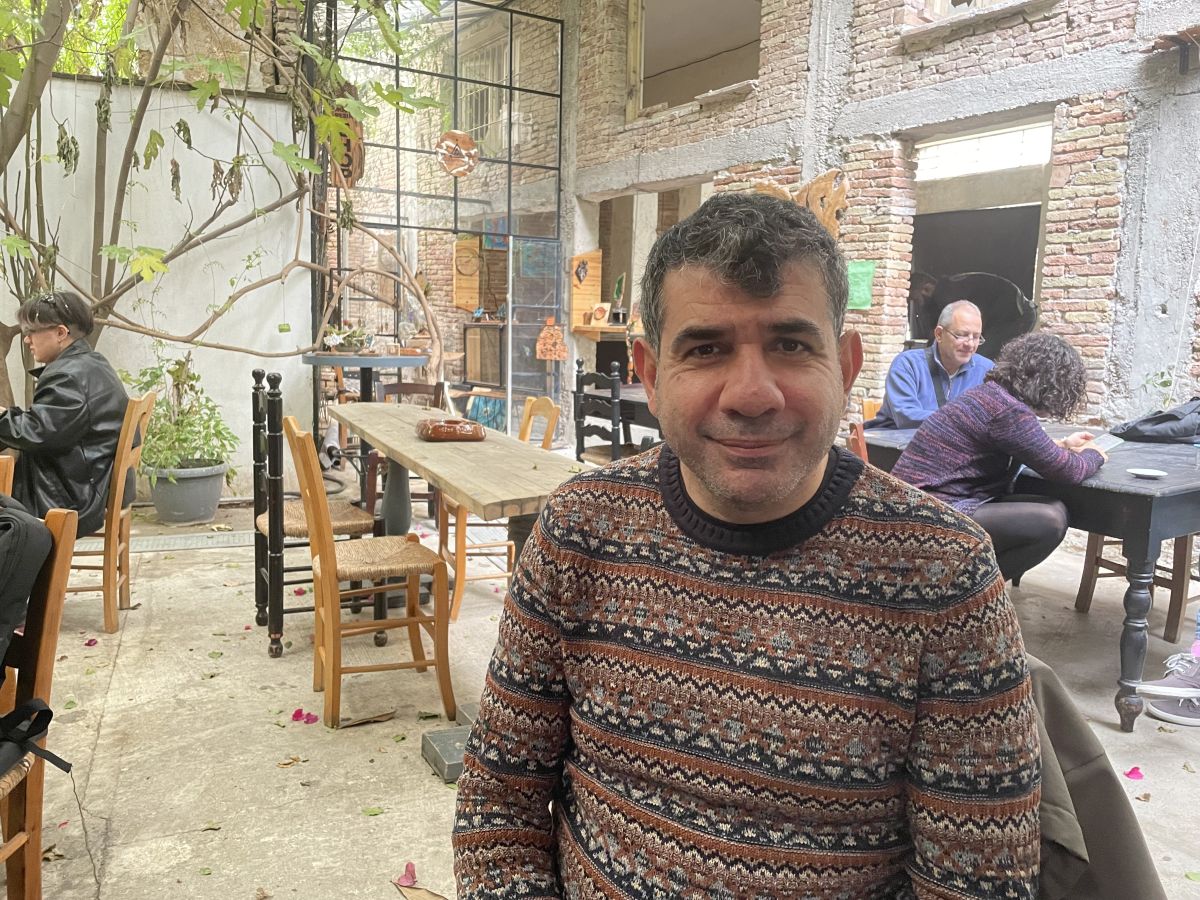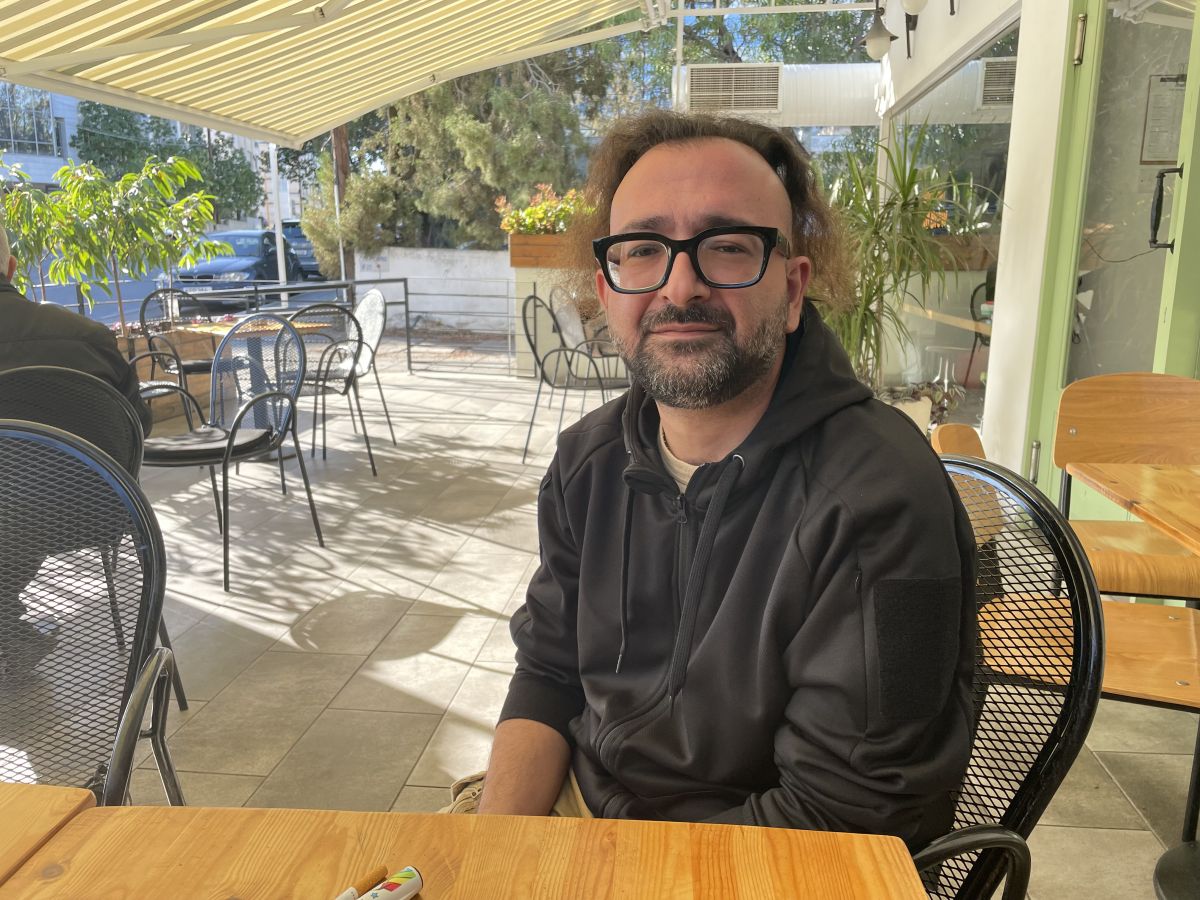Get PolitiFact in your inbox.
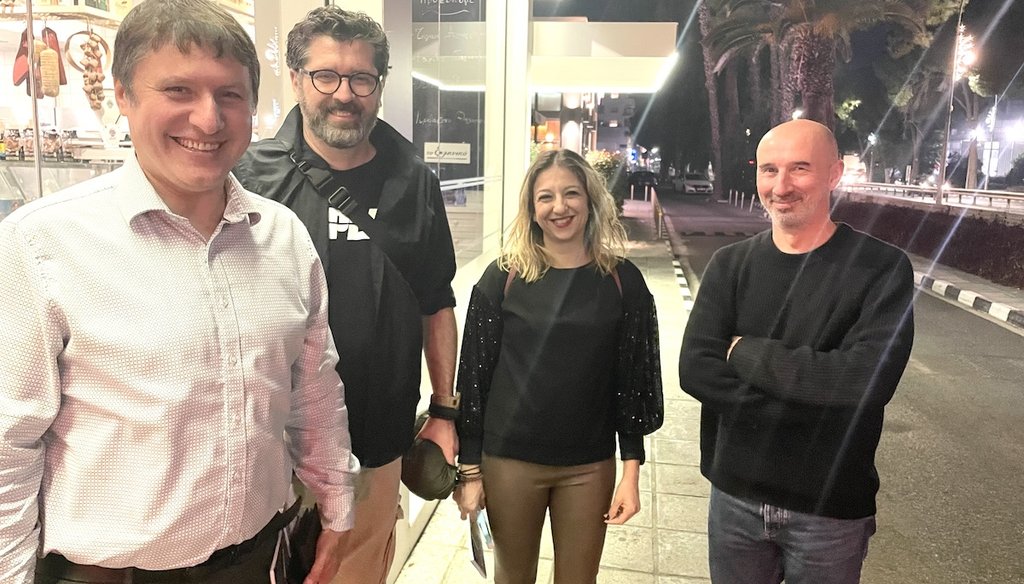
Michael Sirivianos, Cyprus University of Technology professor; Thanos Sitistas, Fact Check Cyprus journalist; Loukia Taxitari, Neapolis University Pafos professor; and Nicholas Karides of the Institute for Mass Media. (Louis Jacobson/PolitiFact)
NICOSIA, Cyprus — Cyprus, an ethnically divided island in the Mediterranean, is like any other nation: It’s been hit by a wave of misinformation, and residents are trying to keep up.
The former British colony — smaller in area than Puerto Rico — is split by a United Nations buffer zone that separates the predominantly Greek south and the predominantly Turkish north. The southern portion, known as the Republic of Cyprus, is in the European Union; the northern portion, the Turkish Republic of Northern Cyprus, is recognized only by Turkey. International-led unification efforts failed in 2004 and 2017, although free passage across the buffer zone has been allowed since 2003 and tensions are generally low.
"With increasing clickbait journalism and fake news, there’s a growing need for fact-checking on the island," said Anil Isik, a freelance journalist and member of the Association of European Journalists Cyprus. The coronavirus pandemic, Isik said, "highlighted the need for credible news and the importance of fact-checkers" in both communities.
Hasan Kahvecioglu, a longtime journalist in Cyprus’ Turkish north, agreed with Isik.
"Because of the divide, we need fact-check journalists even more than other countries," he said. "Turkish Cypriot and Greek Cypriot journalists are not using common terminology."
The pandemic inspired Fact Check Cyprus, a Greek-language website and the most comprehensive effort to date to combat misinformation on the island.
Fact Check Cyprus began as a loose coalition of journalists and academics, focusing on coronavirus-related misinformation. In early 2023, Thanos Sitistas, a Greek-born journalist with experience at the Greek fact-checking site Ellinika Hoaxes, formalized the project, working with Loukia Taxitari, a psychology professor at Neapolis University Pafos; Michael Sirivianos, an engineering and technology professor at the Cyprus University of Technology in Limassol; and several Cypriot expat freelancers in London. It now addresses claims about immigration, LGBTQ+ policy and other issues.
"People here read the same websites as they do in Greece," Sitistas said. "They are subject to the same disinformation channels." These include Russian disinformation, such as claims about the war in Ukraine. Increasingly, Cyprus has been a magnet for Russian transplants and wealth. Sometimes, claims generated or amplified by Iran come to the site’s attention, too, Sitistas said.
Sitistas describes Fact Check Cyprus as more of a "network, not a newsroom." Sitistas added that he and his colleagues plan to apply for accreditation with the International Fact-Checking Network, a division of the Poynter Institute, in early 2024.
Within the EU, Sitistas said, "Cyprus has the same vote as Germany, but it hasn’t gotten enough attention when it comes to fact-checking."
Sitistas and his colleagues say they aren’t seeing that much misinformation focused specifically on Greek Cypriot-Turkish Cypriot tensions, but the island’s physical and linguistic division has posed challenges for fighting off misinformation, journalists, academics and officials said.during a reporter’s weeklong visit to the island.
Linguist Stavroulla Hadjiconstantinou of the Cyprus University of Technology in Limassol, Republic of Cyprus. (Louis Jacobson/PolitiFact)
Stavroulla Hadjiconstantinou, a linguist at the Cyprus University of Technology in Limassol in the Republic of Cyprus, said the island’s division makes people on either side of the buffer zone susceptible to biases. They are "less open to objective or critical evaluation of the information circulated by the media," she said, adding that she works to educate her students on how to detect and counter fake and misleading information online.
Nicholas Nicoli, an associate communications professor at the University of Nicosia in the Republic of Cyprus and co-author of "Digital Democracy, Social Media and Disinformation," agreed. "There are lots of cracks below our society’s surface, and they are not hard to find and accentuate across the digital landscape," Nicoli said.
In Cyprus, "people are not aware of the existence of tools and sites" to fact-check what they see on social media, added Eleni Kyza, a professor of communication and internet studies at the Cyprus University of Technology.
Meanwhile, keeping up with misrepresentations has challenged local journalists, multiple observers said.
Journalists’ salaries are so low that there’s a well-trodden path from journalism into government jobs, often after only a few years, observers say.
"There’s a joke that’s not a joke — that there are more former journalists in the presidential palace than in any newsroom in Cyprus," said Nicholas Karides, director of the Institute for Mass Media, which promotes investigative reporting and media literacy.
Sertac Sonan, an international relations professor at Cyprus International University, at the House of Jade coffee house in northern Nicosia, Turkish Republic of Northern Cyprus. (Louis Jacobson/PolitiFact)
Meanwhile, especially in the Turkish north, businesses and elites with economic interests at stake have been taking over media outlets.
"We still have many independent media outlets, but this is a global problem," said Sertac Sonan, a political scientist at Cyprus International University in northern Nicosia, the predominantly Turkish Cypriot portion of the divided capital. "You don’t have enough funding for independent media."
Kyriakos Pierides, a longtime journalist in the Republic of Cyprus, added that "the mainstream media tends to follow the official narratives. They’re not working toward objective journalism. It’s a very serious situation — it’s producing news without a critical voice."
The island’s small size is another complicating factor, said Shemaine Bushnell, an editor with the Cyprus edition of the Greek newspaper Kathimerini. The two communities in Cyprus have a combined population about the size of Maine’s in the United States.
Cypriots "are reluctant to voice complaints due to the close-knit nature of the community," Bushnell said. "Residents are fearful of needing a favor or engaging in business where the concept of nepotism prevails, so they hesitate to speak out. Whether it’s disinformation, misinformation or a lack of information, the core problem lies not in these factors but in the citizens’ tendency to remain silent."
Perhaps the biggest obstacle in Cyprus is the linguistic divide.
"In Cyprus, the fact that there are two languages poses a problem for fact-checking," said Sami Ozuslu, who worked for three decades as a journalist before winning election to parliament in the Turkish Republic of Northern Cyprus.
Trilingual media coverage — in English, Turkish, and Greek — is needed in Cyprus, said Huri Yontucu, an assistant professor of new media and communication at Arkin University of Creative Arts and Design in northern Cyprus.
"People don’t know what’s going on on the other side," Yontucu said. "In divided and conflicted societies, one of the important things is collaborating with and learning about others. Media is one of the significant tools that play a common role in increasing and decreasing the tensions among conflicted societies by informing them about the ‘other.’"
Media studies professor Huri Yontucu at the Büyük Han in northern Nicosia, Turkish Republic of Northern Cyprus. (Louis Jacobson/PolitiFact)
A rare "bicommunal" media effort spanning the Greek and Cypriot communities is "Mazi/Birlikte" ("Together"), a TV show that airs for an hour once a week on the Cyprus Broadcasting Corp., a public broadcaster. "We want to show people sharing the same experience — it doesn’t matter their ethnicity," said Vasvi Çiftçioğlu, one of the show’s journalists.
Even so, the current version of the show has been downsized. From 2004 to 2018, its predecessor show aired daily.
Television journalist Vasvi Çiftçioğlu at the Rüstem Kitabevi used book store and cafe in northern Nicosia, Turkish Republic of Northern Cyprus. (Louis Jacobson/PolitiFact)
On the upside, there seems to be a growing demand for expanding residents’ media literacy, and several efforts to improve it are underway.
A fact-checking and misinformation presentation by the author at the Pedagogical Institute, an arm of the Republic of Cyprus’ education ministry in the Nicosia suburb of Latsia, drew roughly two dozen middle- and secondary school teachers during the school day. Many of the teachers said they are eager to learn what they can do to improve their students’ social media habits.
Yontucu, who teaches media literacy to her college students, welcomes such interest. Media literacy, she said, "should be started from primary school." Other academics and journalists echoed this.
Kathimerini Cyprus newspaper journalist and analyst Ioannis Ioannou at the Daily Roast in Nicosia, Republic of Cyprus. (Louis Jacobson/PolitiFact)
"To deal with all this, we need to work on media literacy," said Ioannis Ioannou, a journalist and foreign policy analyst with the Cyprus edition of the newspaper Kathimerini. "We need a strategy to win that."
At Eastern Mediterranean University in Famagusta, the Turkish Republic of Northern Cyprus’ biggest city other than northern Nicosia, media literacy is a required course for journalism students, said Hanife Aliefendioğlu, the chair of the new media and journalism department. The course description says it "encourages a critical, creative, and questioning attitude and orientation toward the media in all its various forms."
Journalists, academics and other officials said money, technical expertise and training will all be key to improving media literacy in Cyprus.
"It’s an arms race," said Sirivianos, the professor and Fact Check Cyprus contributor.
Our Sources
Interviews, Dec. 4-9, 2023, with:
Shemaine Bushnell, editor with the Cyprus edition of the Greek newspaper Kathimerini
Stavroulla Hadjiconstantinou, linguist at the Cyprus University of Technology
Ioannis Ioannou, journalist and foreign policy analyst with the Cyprus edition of the newspaper Kathimerini
Nicholas Karides, director of the Institute for Mass Media
Eleni Kyza, professor of communication and internet studies at the Cyprus University of Technology.
Nicholas Nicoli, associate professor of communication at the University of Nicosia and co-author of "Digital Democracy, Social Media and Disinformation"
Kyriakos Pierides, longtime journalist in the Republic of Cyprus
Michael Sirivianos, engineering and technology professor at the Cyprus University of Technology
Thanos Sitistas, journalist with Fact Check Cyprus
Loukia Taxitari, psychology professor at Neapolis University Pafos
Hanife Aliefendioğlu, chair of the new media and journalism department at Eastern Mediterranean University
Vasvi Çiftçioğlu, journalist with the Cyprus Broadcasting Corp. show, "Mazi/Birlikte" ("Together")
Anil Isik, freelance journalist and member of the Association of European Journalists Cyprus
Hasan Kahvecioglu, journalist in the Turkish Republic of Northern Cyprus
Sami Ozuslu, former journalist and now a member of parliament in the Turkish Republic of Northern Cyprus
Sertac Sonan, professor of international relations at Cyprus International University
Ahmet Sözen, political scientist at Eastern Mediterranean University
Huri Yontucu, assistant professor of new media and communication in the Turkish Republic of Northern Cyprus

